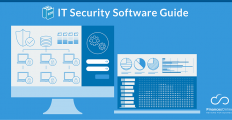You’ve probably heard of the term Industry 4.0. Well, today, we’re talking about Industry 4.0 and ERP.
Technology has been an important part of the manufacturing industry for many years. In the era of Industry 4.0, Enterprise Resource Planning (ERP) systems have become a key driver of efficiency and integration across industries.
Now, an entirely new wave of technological innovation has come into manufacturing. We’re looking at what Industry 4.0 means for your business and why an enterprise resource planning (ERP) solution is vital to this movement.
So, let’s dig in.

What Is Industry 4.0?
Industry 4.0 represents the fourth industrial revolution, marked by the fusion of cyber-physical systems, the Internet of Things (IoT), cloud computing, and cognitive computing. At its core, it aims to create a smart, connected ecosystem where data flows seamlessly between devices and systems.
Industry 4.0 market was valued at USD 103.9 billion in 2022 and is expected to grow at a CAGR of over 19% from 2023 to 2032.
What is the Industry 4.0 Revolution?
The Industry 4.0 revolution signifies the fusion of
- Digital
- Physical
- Biological systems.
It’s creating a seamless connection between machines, processes, and humans.
It encompasses technologies like the Internet of Things (IoT), artificial intelligence (AI), big data, and automation. This transformative wave is not just about upgrading machinery but involves a holistic reimagining of how industries operate and deliver value.
What is ERP?-The Backbone of Business Intelligence
Enterprise Resource Planning (ERP) is a comprehensive software solution that integrates and manages core business processes. From finance and HR solutions to supply chain and manufacturing, industry ERP provides a unified platform for seamless operations.
How Industry 4.0 And ERP Compliment Each Other
An enterprise resource planning system is the glue that holds an organisation together. With an ERP system, it is nearly possible to track and analyse the hundreds of new data inputs that Industry 4.0 technology creates.
While ERP systems are already integral for organisations’ day-to-day operations, Industry 4.0 makes ERP systems even more important. For example, new technology in your facilities means new vulnerabilities from a network security perspective. An ERP system, such as sales ERP software, can help you protect the data that is being tracked and communicated by your devices. An ERP system easily synchronises all of the data.
Key Components of Industry 4.0 and ERP Integration
IoT (Internet of Things)
The IoT plays an important role in Industry 4.0 by connecting devices and systems. When integrated with ERP, it allows for real-time monitoring of assets, predictive maintenance, and improved supply chain visibility.
Cloud Computing
Both Industry 4.0 and ERP benefit from cloud computing. Cloud-based ERP solutions provide scalability, flexibility, and accessibility, making it easier for organisations to embrace the digital transformation brought by Industry 4.0.
Big Data Analytics
The integration of Industry 4.0’s big data with ERP analytics enables organisations to gain deeper insights into their operations. This results in better forecasting, resource optimisation, and overall improved decision-making.
Cyber-Physical Systems
Industry 4.0 relies on cyber-physical systems that combine computational and physical processes. Industry ERP ensures the seamless integration of these systems, providing a holistic view of the entire value chain.
The Synergy Between Industry 4.0 and ERP
Improves Connectivity
Industry 4.0 thrives on interconnected devices and systems. ERP, with its robust infrastructure, ensures a continuous flow of information across various departments, fostering a connected ecosystem. This connectivity improves collaboration and accelerates decision-making processes.
Real-time Data Integration
One of the core strengths of ERP is its ability to handle real-time data. When combined with Industry 4.0 technologies like IoT sensors and smart devices, ERP becomes the backbone for processing and utilising real-time data. This integration facilitates quicker response times and data-driven decision-making.
Improved Decision-Making
Industry 4.0 generates large amounts of data through sensors and smart devices. ERP systems, through advanced analytics, convert this data into meaningful insights. The synergy between the two empowers organisations to make informed decisions, optimise processes, and stay ahead of the competition.
Automation and Smart Manufacturing
Industry 4.0 is synonymous with automation and smart manufacturing. ERP complements this by managing and optimizing automated processes. The integration ensures that production data, supply chain information, and financial transactions are seamlessly coordinated, resulting in a more efficient and responsive manufacturing environment.
Industry 4.0 And ERP -Benefits Galore
Improves Visibility and Control
In the era of Industry 4.0 and ERP, businesses attain unprecedented visibility into their operations. Real-time monitoring allows for proactive decision-making, minimising downtime and maximising output.
Optimized Resource Utilization
Industry 4.0’s data-driven insights, when harmonised with ERP’s resource management capabilities, result in optimal resource allocation. From raw materials to manpower, even tasks as seemingly trivial as custom logo designs for business, every aspect is fine-tuned for efficiency.
Agile Adaptability
The business landscape evolves rapidly, and agility is key. With Industry 4.0 and ERP integration, organisations can swiftly adapt to market changes, staying ahead of the curve.
Cost-Efficiency Redefined
Automation and streamlined processes translate to cost savings. We are already aware of how much an ERP system costs. Industry 4.0’s predictive maintenance and ERP financial acumen join forces, ensuring that every penny is wisely spent.
Customer-Centric Innovation
Leveraging Industry 4.0’s innovation capabilities alongside ERP’s customer data management, businesses can tailor products and services to meet evolving good customer service.
Intersecting Technologies
The intersection of Web 3.0, Industry 4.0, and ERP brings about a powerful synergy. As businesses leverage these technologies collectively, they unlock new dimensions of innovation, efficiency, and customer satisfaction. Real-world applications range from personalised user experiences to adaptive manufacturing processes in smart factories.
The Transformation of Manufacturing
In the manufacturing sector, the integration of Web 3.0, Industry 4.0, and ERP leads to the emergence of smart factories. These connected systems optimise production, minimise downtime, and adapt to changing demands swiftly, marking a new era in adaptive manufacturing.
Manage Supply Chain
The integration of Industry 4.0 and ERP extends beyond the factory floor to encompass the entire supply chain. With real-time data on inventory levels, demand fluctuations, and production schedules, businesses can fine-tune their supply chain processes. This leads to reduced lead times, minimised stockouts, and an overall more resilient supply chain.
Improved Quality Control
Industry 4.0 technologies introduce advanced monitoring and control mechanisms on the shop floor. ERP complements this by integrating quality control processes into the overall production flow. The result is not just the detection of defects but also proactive measures to prevent them, ensuring a higher standard of product quality.
ERP, Manufacturing, And The Future
As we delve deeper into the symbiosis of Industry 4.0 and ERP, it becomes evident that this collaboration. It is not just a present-day necessity but a blueprint for the future of manufacturing. The infusion of artificial intelligence and machine learning into ERP systems will further elevate predictive analytics. It allows businesses to foresee trends, optimise operations, and make strategic decisions with unparalleled foresight.
The future landscape also envisions ERP systems seamlessly integrating with emerging technologies such as blockchain. This integration can revolutionise supply chain transparency and traceability, addressing concerns related to authenticity and ethical sourcing. As Industry 4.0 continues to evolve, ERP systems will play an important role. It will help you shape a connected, intelligent, and highly responsive manufacturing ecosystem.
Conclusion
In conclusion, the collaboration between Industry 4.0 and ERP is more than just a technological integration. It’s a strategic move towards future-proofing businesses. From improving operational efficiency to unlocking new dimensions of competitiveness, this synergy is reshaping industries. Embrace the power of Industry 4.0 and ERP, and position your business at the forefront of the digital revolution.






















Leave a comment!